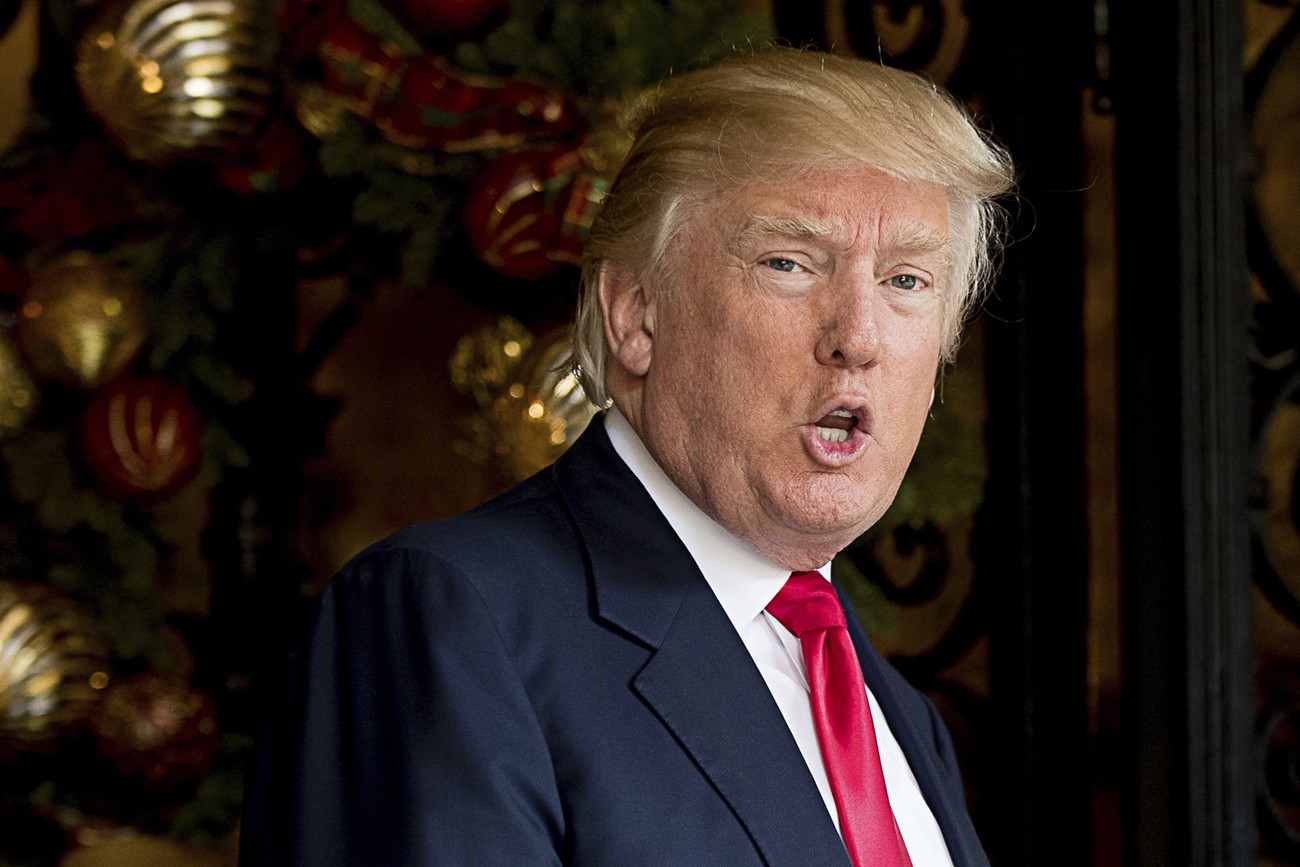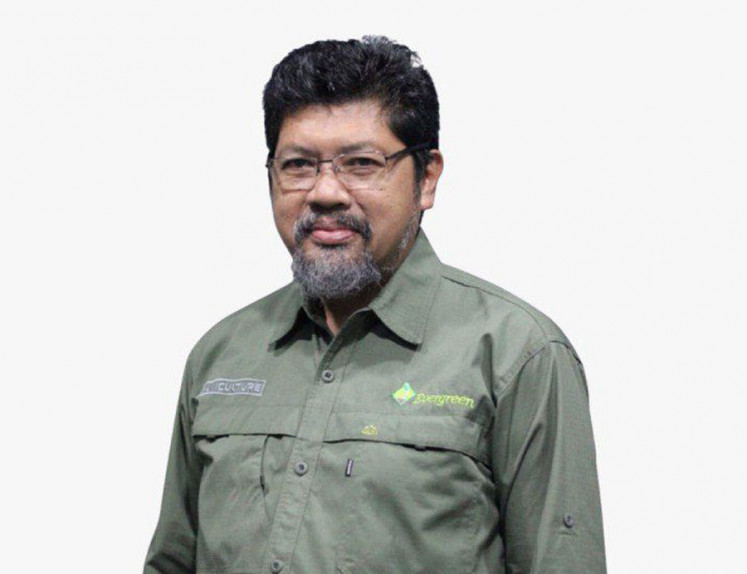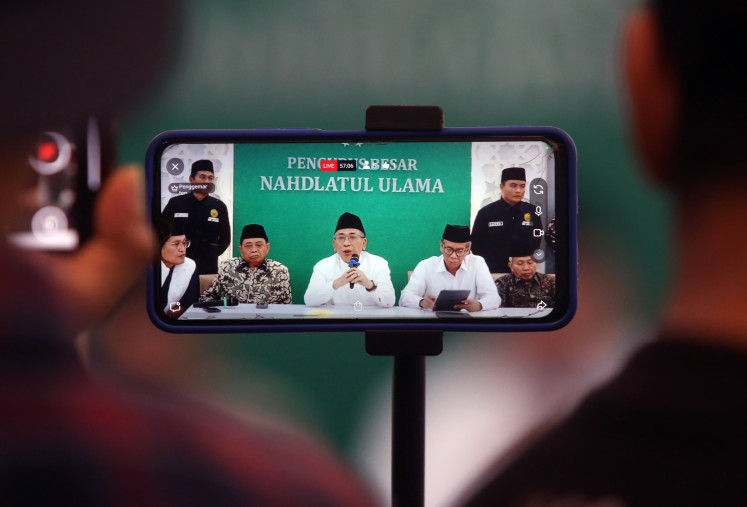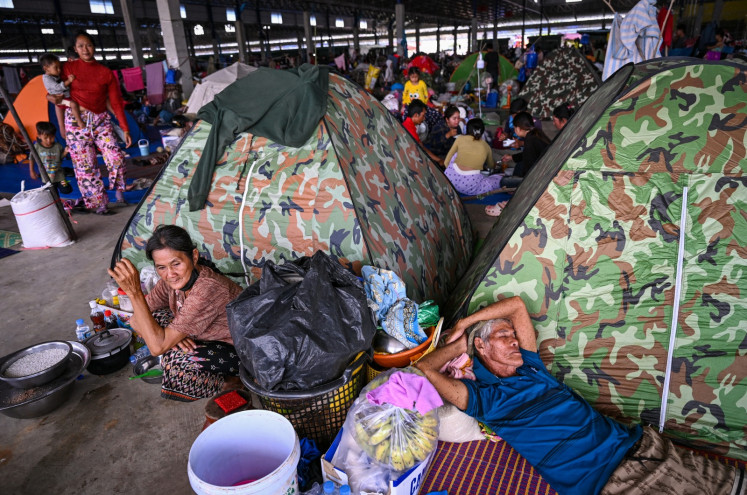Popular Reads
Top Results
Can't find what you're looking for?
View all search resultsPopular Reads
Top Results
Can't find what you're looking for?
View all search resultsPost-US presidential election: Years of living in uncertainty?
While waiting for the dust to finally settle post-presidential election in the United States, it is highly relevant that we ponder the shape of global order ahead of us.The US presidential election has always received close attention. Moreover, this time in 2016, it was given a huge amount of attention.
Change text size
Gift Premium Articles
to Anyone
 Staying firm -- In this Dec. 21, 2016, file photo, President-elect Donald Trump speaks to members of the media at Mar-a-Lago, in Palm Beach, Fla. Trump is questioning the effectiveness of the United Nations, saying it's just a club for people to "have a good time." His post on Twitter on Monday is the president-elect's latest comment since the UN Security Council voted Friday to condemn Israeli settlements in the West Bank and east Jerusalem. (AP/Andrew Harnik, File)
Staying firm -- In this Dec. 21, 2016, file photo, President-elect Donald Trump speaks to members of the media at Mar-a-Lago, in Palm Beach, Fla. Trump is questioning the effectiveness of the United Nations, saying it's just a club for people to "have a good time." His post on Twitter on Monday is the president-elect's latest comment since the UN Security Council voted Friday to condemn Israeli settlements in the West Bank and east Jerusalem. (AP/Andrew Harnik, File)
W
hile waiting for the dust to finally settle post-presidential election in the United States, it is highly relevant that we ponder the shape of global order ahead of us.
The US presidential election has always received close attention. Moreover, this time in 2016, it was given a huge amount of attention.
Millions of global citizens followed attentively US political dynamics and debates and, needless to say, the antics and disposition of Trump captivated many for various reasons.
The plethora of issues and drama surrounding the US election process steered a lot of emotional outpouring within and beyond the US borders.
Seemingly, as days pass, the anxiety has yet to subside as we continue to be spellbound with the drama.
Questions arise, such as will we remember 2016 as a new turning point in US politics? Will it be a smooth turn, a bumpy one or a reverse? If it was a reverse, what would be the consequences at the global and regional levels as well as with inter-state relations? Do we enter a new global order, which is more orderly, or must we prepare for a new era of volatility?
Already governments across the world are strategizing in the context of their bilateral relations with the US. They are also assessing broader interests, by ways of simulating prospective geopolitics and geo-economic realities.
There are wide ranges of variables, both constant and dynamic, that policy makers must carefully assess. Ranging from political platforms of the Republican Party, campaign rhetoric and the idiosyncrasies of the president-elect, to the line of political appointees.
For one thing, the nomination of the billionaire to fill key administration positions, including Secretary of State, make us wonder if economic interests will be a key parameter in the foreign policy decision making process.
Hence, will there be a declining interest on the part of the US on development issues, especially the UN Sustainable Development Agenda 2030? On the contrary, perhaps we will witness a new push for attaining the agenda because billionaires always have excess to spend through Corporate Social Responsibility (CSR).
On security and strategic issues, a sense of uncertainty toward US global leadership appears prevalent. This was observable during the Halifax International Security Forum, on Nov. 18-20 in Halifax, Nova Scotia, Canada, where decision makers and security pundits from over 60 countries gathered.
Interestingly enough, participants of the forum were not satisfied with the explanation given by the two most senior ranking Republican senators in the US delegation, Senator John McCain and Senator John Barrasso, about future US commitments in various strategic theatres under the Trump administration.
Nevertheless, the majority of participants agreed that nationalism is on the rise. Still, nationalism — in its extreme (xenophobic or chauvinistic) or in its benign manifestation (patriotism) — remains an aberration in supposedly an increasing interconnectedness among countries and nations.
While questions on US commitment to NATO were central in the forum’s discussion, geopolitical and geostrategic challenges in Asia, especially concerning the Korean Peninsula and the South China Sea, also received sufficient attention. In the discussion, the most pressing issues was the security predicament in Asia should US interests toward the region wean.
In anticipation of such eventuality, especially the possible power vacuum in Asia, regional countries including Indonesia will have to develop strategies and identify available options. Such strategies must combine both idealism and realism in international relations.
From the perspective of idealism, consolidation in and cohesion within ASEAN are key. Yet, this is a work in progress. We shall always remember that the founding fathers of ASEAN envisioned an ASEAN — a united ASEAN — to serve as a bulwark against any attempt by a third party to meddle in regional affairs.
Indeed, ASEAN is equipped with infrastructures such as the ASEAN Regional Forum (ARF) and the East Asia Summit (EAS) to discuss and explore solutions to security challenges.
EAS has been successful in bringing together leaders from ASEAN countries, the US, Russia, China, India and other regional powers to discuss pressing security challenges. Often times, EAS includes in its discussions maritime security issues, such as South China Sea disputes.
This achievement makes EAS increasingly more relevant. It remains to be seen if the incoming US president will participate in the next EAS in 2017 under the Philippine chairmanship.
At the same time, deepening strategic cooperation with major powers in the region on areas of mutual interest is necessary. Through webs of cooperation at the regional level, any potential hegemon will have to think twice before resorting to illadvised courses of action that affect peace and stability.
No country, big or small, is an island and therefore mutual respect and close cooperation are essential.
Meanwhile, regional countries should not by any means leave their fate completely on the idealism paradigm in international relations. When it comes to security assurances, they should combine idealism or constructivism with efforts to increase national defense capability, in line with the self-help doctrine.
From a realist perspective, we are living in an anarchic world system, and therefore nation states must make efforts to strengthen their national capacity in order to respond effectively to external challenges.
In the case of Indonesia, to strengthen our forward defense in and around the Natunas is among the priorities.
Post-US presidential election, we are entering a new era of greater unpredictability in international relations. Hence, we must stay alert and revamp our capability from time to time.
---------------
We are looking for information, opinions, and in-depth analysis from experts or scholars in a variety of fields. We choose articles based on facts or opinions about general news, as well as quality analysis and commentary about Indonesia or international events. Send your piece to community@jakpost.com. For more information click here.









